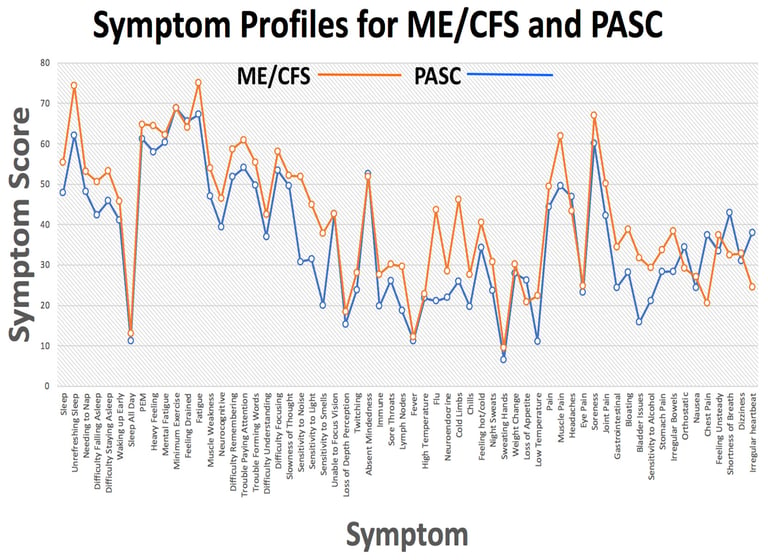When your Burnout won't End
Many people experience persistent symptoms of exhaustion following burnout. For several years, there has been a theory that chronic fatigue syndrome (CFS) and burnout are two sides of the same coin.
Julia Dorenwendt
11/19/20253 min read
I had been meeting regularly with a friend for some time. When we started talking about our symptoms, she said she had CFS and I said I had burnout. We described almost identical symptoms: the same exhaustion after exercise, the same brain fog, the same fogginess in our heads. How could that be, if she had CFS and I had burnout?
Is it the same thing?
Struck as if by lightning, I went home and sat down at my computer. Could it be that we were suffering from the same thing? Could it be that burnout and ME/CFS were the same thing? And indeed, there has long been a theory in research that burnout and ME/CFS are one and the same, and that the difference lies solely in the attribution of causes: burnout is often considered to be psychologically induced, while CFS is attributed to a physical illness.
Until the pandemic, hardly anyone was interested in researching ME/CFS. It was only with Long COVID that the topic gained momentum. Why am I bringing up Long COVID? Because Long COVID and ME/CFS have very similar symptoms.


Sources:
[1] By Chart: David MarksData: w:Leonard A. Jason, Mohammed F. Islam, Karl Conroy, Joseph Cotler, Chelsea Torres, Mady Johnson, and Brianna Mabie - Chart: "Converging Evidence of Similar Symptomatology of ME/CFS and PASC Indicating Multisystemic Dyshomeostasis", doi:10.3390/biomedicines11010180Data: "COVID-19 symptoms over time: comparing long-haulers to ME/CFS", doi:10.1080/21641846.2021.1922140, CC BY 4.0, https://commons.wikimedia.org/w/index.php?curid=132775976
[2] Basierend auf Erkenntnissen aus Jameson, D. (2016) Persistent Burnout Theory of Chronic Fatigue Syndrome., zitiert und vereinfacht für diesen Artikel.
Jameson, D. (2016) Persistent Burnout Theory of Chronic Fatigue Syndrome. Neuroscience and Medicine, 7, 66-73. doi: 10.4236/nm.2016.72008. https://www.scirp.org/journal/paperinformation?paperid=67193
[1] Symptome profile of ME/CFS and COVID-19*
Initial stress gone but exhaustion remains?
My own burnout was years ago, and the symptoms were still there. Research confirms that ME/CFS is essentially a state of persistent exhaustion, a kind of burnout that never ends. Even when all the original stressors are gone, the symptoms remain because the system gets stuck in a state of burnout. This state of persistent exhaustion persists because the body's stress system is out of balance and certain patterns of thinking and behavior have crept in that keep the body on high alert.
ME/CFS and burnout often develop after long periods of stress and excessive demands and show similar symptoms, such as severe fatigue, concentration problems, and feelings of complete physical and mental exhaustion.
Researchers suspect that in both conditions, the body's stress system, i.e., the connection between the brain and hormones that normally helps to cope with stress, has become unbalanced. This system then no longer reacts as strongly as it used to, and too little cortisol (stress hormone) is released. As a result, the body can no longer switch properly between activity and rest. The result: you feel constantly exhausted, even when you are resting.
You've never had burnout?
Prolonged stress over a long period of time can lead to ME/CFS. Even if the causes may not be obvious, it can still be related to your thought patterns, attachment trauma experiences, behaviors, and evaluations. In my case, I had PTSD (post-traumatic stress disorder), and the burnout and subsequent chronicity of my symptoms had several triggers that occurred over a period of 2-3 years:
Loneliness during the pandemic
Fancy job in IT, including a problematic manager
Termination, new job, termination
Death of my father
Caring for my grandmother after her stroke
Theft by people I trusted
The result of all this was: brain fog, palpitations, exhaustion, nightmares, concentration problems, gastrointestinal complaints. Perhaps you are familiar with similar conditions, even if your triggers were different: a breakup, a birth, building a house, a new responsibility. Even happy events can overwhelm the system when there is too much going on at once.
I have never been diagnosed with ME/CFS. Why is that? I think it's because most doctors are unfamiliar with the condition. When someone with my history goes to see them, they assume it's burnout. However, if the symptoms persist over an extended period, it is more likely that it has morphed into ME/CFS. I have met many women and men who have not received a diagnosis either. They are completely at a loss as to what is happening to them. Even if they have been diagnosed, it usually doesn't help, as there is no prescription for managing stress and relaxation.
Everyday Stress isn't avoidable
Recovery is less about simply avoiding everyday stress, which is impossible in our world. Besides, stress is relative to the person experiencing it. It's much more important to regain confidence in your own self-efficacy, focus on positive goals, and achieve those goals in small steps to experience flow [2] again.
Get back into the Flow.
Copyright - Fatigue Switch 2025
